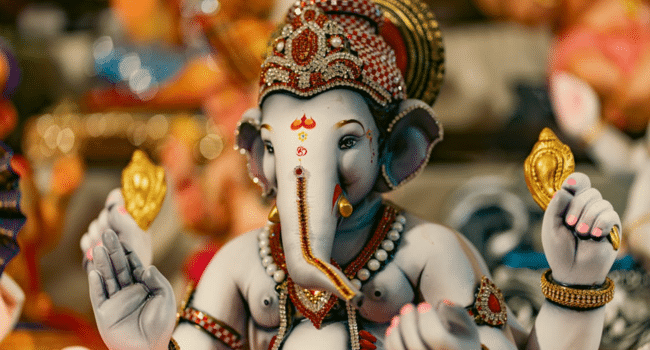Table of Contents
To many Hindus, numbers go way beyond math; they hold energy, symbolism, and often a touch of the divine. They’re woven deeply into rituals, stories, mantras, and everyday life. Certain numbers are believed to carry divine vibrations, connect us to cosmic truths, and bring auspicious energy when used with intention.
If you’ve ever noticed the repetition of numbers in Hindu prayers, temple rituals, or sacred texts, it’s not by accident. These numbers are full of meaning.
108 – The Most Sacred Number
Let’s start with perhaps the most revered number in Hinduism: 108.
This number shows up everywhere, from the 108 beads on a mala (prayer necklace) to the number of times a mantra is repeated during meditation or worship. But why 108?
In Vedic tradition, 108 is believed to represent the entire universe. There are many layers of symbolism tied to this number:
- When you multiply 9 and 12, you get 108, a number packed with meaning. The number 9 often stands for spiritual fulfillment or completeness, while 12 is linked to the twelve zodiac signs or months of the year, symbolizing the cycle of time.
- There are said to be 108 energy lines (nadis) converging at the heart chakra.
- In astronomy, the distance between the Earth and the Sun is approximately 108 times the Sun’s diameter.
- It’s common in Hindu tradition for gods and goddesses to have 108 names, and chanting them is seen as a deeply sacred practice.
Whether in yoga, astrology, or devotion, 108 is considered a sacred portal to the divine. Chanting a mantra 108 times is believed to help you tune into universal energy and strengthen your spiritual connection..
7 – The Spiritual Path
Another powerful number in Hinduism is 7. It appears again and again in both religious practice and cosmology:
- 7 chakras (energy centers) in the body
- 7 sacred rivers, such as Ganga, Yamuna, and Saraswati
- 7 steps (Saptapadi) taken by a couple during a Hindu wedding, each representing a vow
- 7 worlds (lokas) above and 7 below, according to Hindu cosmology
Because of these deep connections, 7 is considered a spiritual number that represents awakening, wisdom, and a journey toward liberation (moksha). As a numerologist from chi-nese.com explains, it’s considered lucky not because it brings material wealth, but because it aligns us with higher truths.
3 – The Divine Trinity
In Hinduism, 3 is far more than just a number; it’s the symbol of Trimurti, the holy trinity of the divine:
- Brahma – the creator
- Vishnu – the preserver
- Shiva – the destroyer
Together, these three deities represent the cyclical nature of the universe: birth, life, and death. Number 3 is seen as balanced, sacred, and essential. It also echoes through practices like lighting three incense sticks or performing rituals in threes.
For many Hindus, 3 is a lucky number because it represents divine protection and balance in life’s ever-changing flow.
9 – Completion and Cosmic Power
9 is another highly auspicious number in Hinduism. It symbolizes completeness, spiritual achievement, and the divine force that governs the universe.
- There are 9 forms of Goddess Durga, celebrated during the Navaratri festival, which spans nine nights.
- The Navagraha (the nine planetary deities) play a central role in Vedic astrology and are worshipped to reduce karmic obstacles.
- According to numerology, 9 is the highest of the single digits, representing spiritual wisdom, strength, and the end of a cycle.
When people choose dates or numbers associated with 9, it’s often because they want divine blessings and protection during big life changes.
1 and 11 – Unity and New Beginnings
The number 1 stands for oneness with the divine and the beginning of all creation. It’s considered lucky because it represents clarity, focus, and a fresh start, especially when embarking on a spiritual path.
11, often seen as an auspicious number in Hindu rituals, is believed to magnify the energy of 1. It’s common to offer 11 coconuts, chant a mantra 11 times, or donate in multiples of 11. It’s seen as a sign of balance between the physical and spiritual realms.
Even Everyday Numbers Hold Meaning
In Hindu culture, even seemingly ordinary numbers carry subtle meanings:
- 4 is sometimes avoided, as it can be linked to stability but also stagnation or death, depending on context.
- 5 (associated with the five elements – earth, water, fire, air, and space) can be considered balanced and lucky.
- Numbers are often adjusted or combined (e.g., naming a baby or starting a business on a date that adds up to 3, 6, or 9) based on Vedic numerology and personal birth charts.
Final Thoughts
Hinduism is a religion of symbolism and connection, where numbers aren’t just digits, but doorways. They link the physical world with the spiritual one, guiding rituals, practices, and even major life choices. Whether it’s repeating a mantra 108 times, taking 7 vows at your wedding, or choosing a baby name based on numerology, numbers help bring a sense of harmony and divine alignment.
You don’t have to be deeply religious to feel the power of these numbers. Sometimes, simply being aware of them can bring a sense of peace, purpose, and flow to your life. Because in the end, numbers, like everything else in Hinduism, are just another way to connect with something bigger than ourselves.
